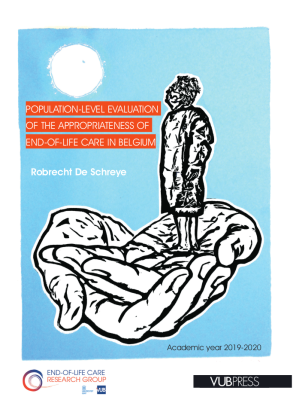Author: Robrecht De Schreye
Date: 02-09-2020
Promoters: Prof. dr. Joachim Cohen (Vrije Universiteit Brussel), Prof. dr. Tinne Smets (Vrije Universiteit Brussel), Co-promoter: Prof. dr. Luc Deliens (Vrije Universiteit Brussel)
SUMMARY OF THE DISSERTATION
With a growing proportion of the population suffering from life-limiting diseases such as cancer, COPD or dementia, appropriateness of care near the end of life is an increasingly important concern for health care researchers, practitioners and policy makers. In this study, we develop and measure population-level quality indicators of appropriate and inappropriate end-of-life care. These indicators represent different domains of care: aggressiveness of care, pain and symptom treatment, palliative care, place of treatment and place of death, coordination and continuity of care. An example of an indicator of possible inappropriate end-of-life care could be 'the percentage of people with cancer being submitted to diagnostic testing in the last 14 days of their life". To measure the quality indicators on a full population level in Belgium (N = 100.000+ deceased each year), we used linked administrative databases, managed by the Intermutualistic Agency, the Belgian Cancer Registry and Statistics Belgium.
Measuring all indicators and comparing them across health care regions, we found several opportunities for improvement, for example: across the population, continuity of care could be improved by investing in advance care planning and implementation of care plans. For people with COPD, more and earlier palliative care could improve the quality of end-of-life care. For people with dementia, deprescribing of medication and support for palliative care by general practitioners and in nursing homes would be useful. We suggest the government supports high quality end-of-life care by reimbursing appropriate end-of-life care interventions.

